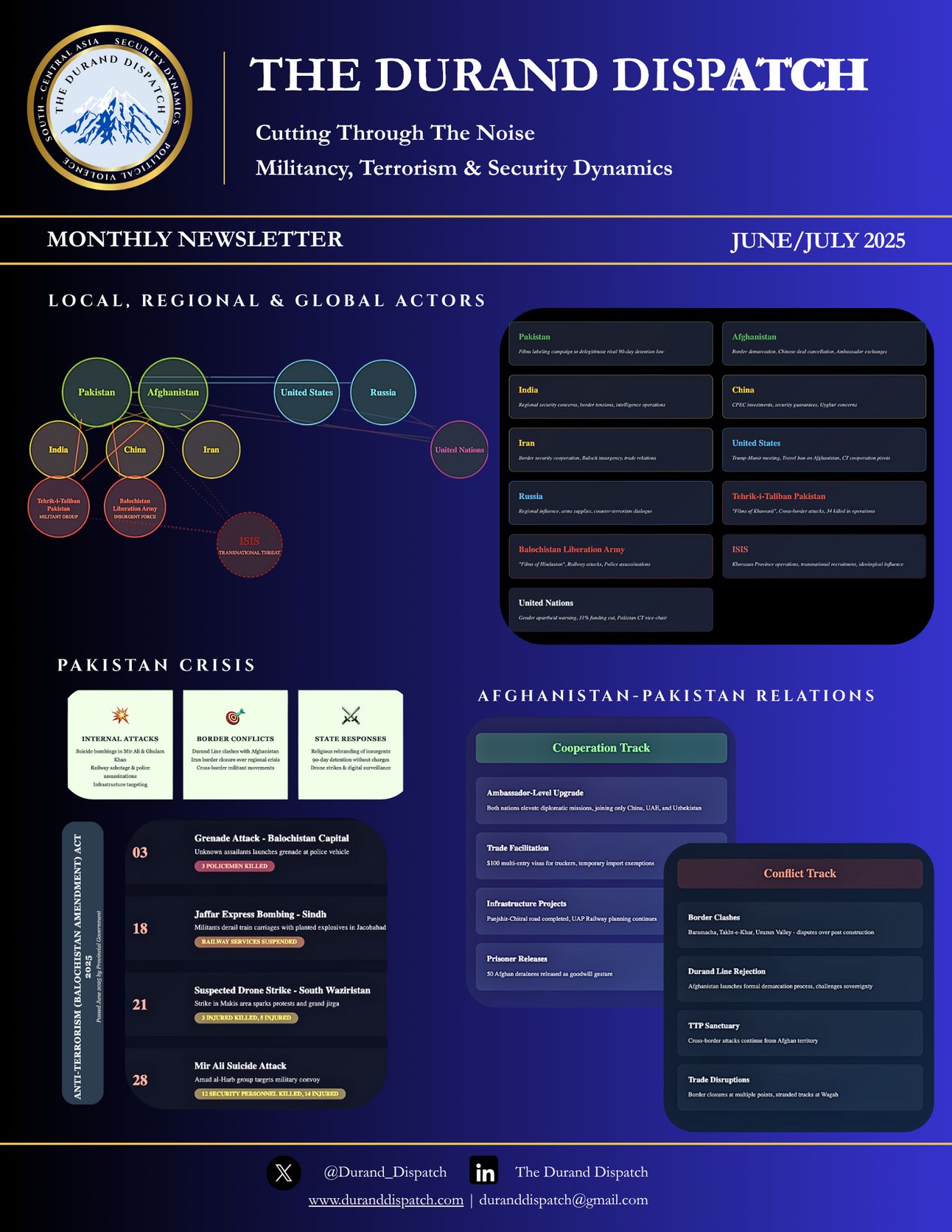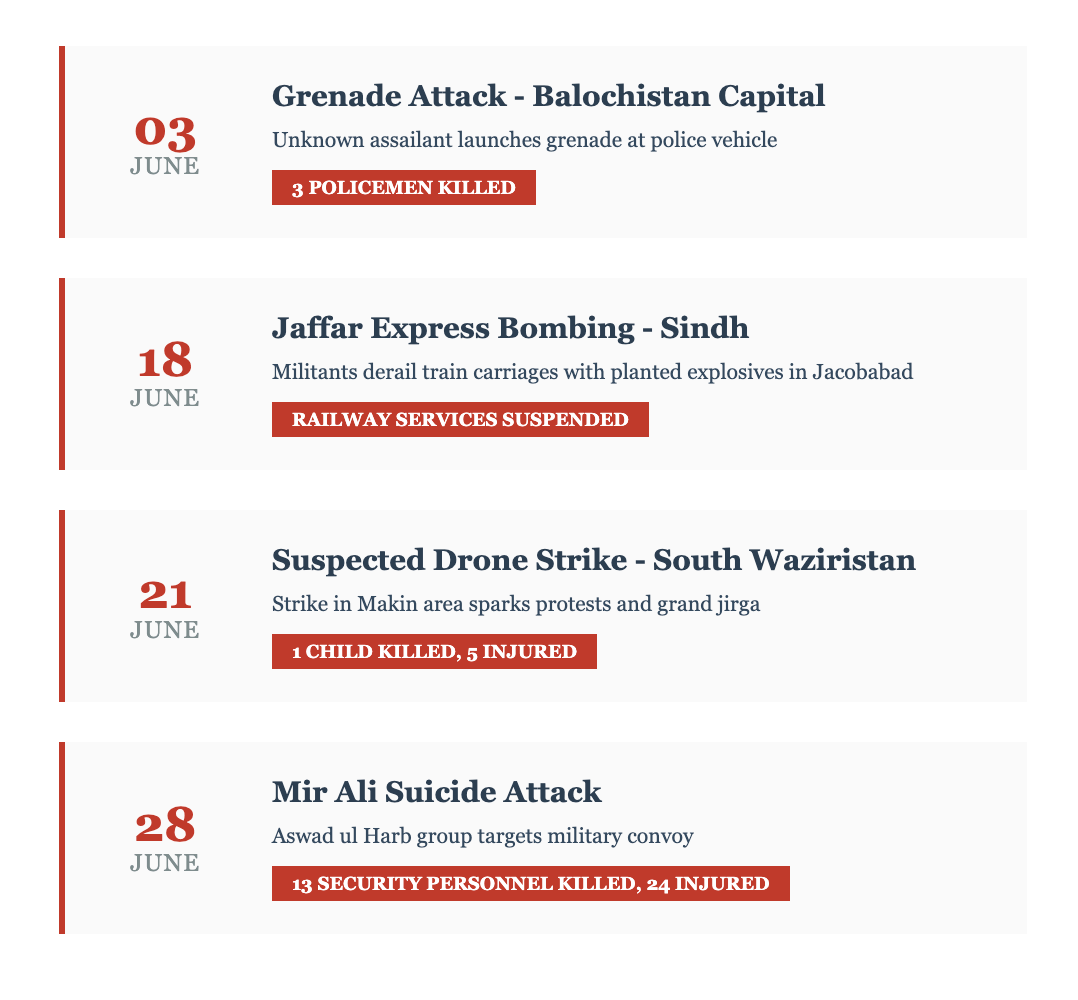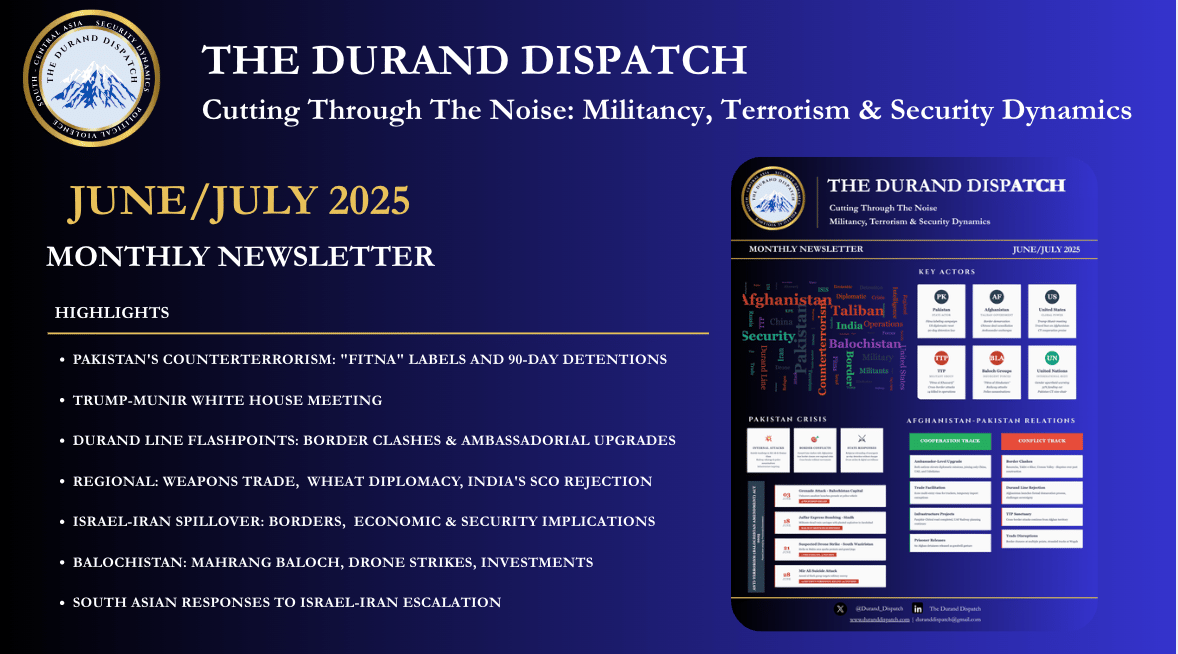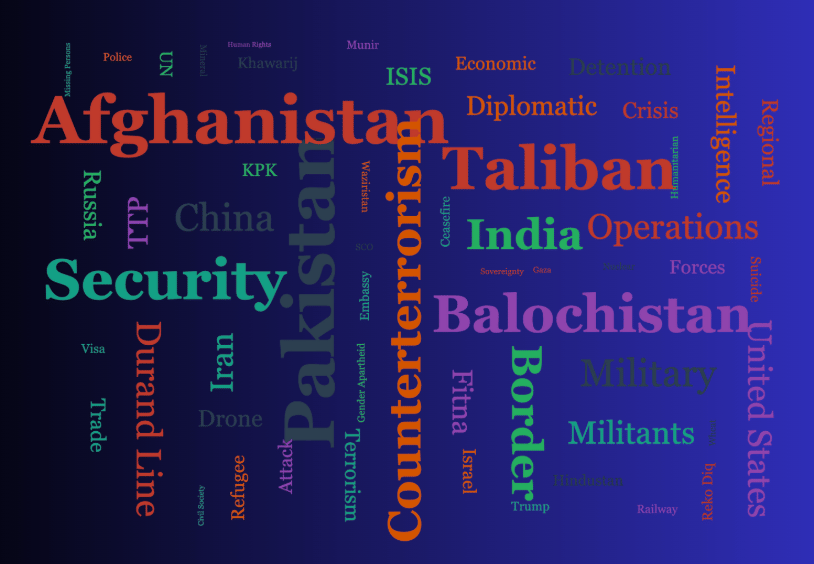
Editor’s Note
Welcome to Durand Dispatch: Perspectives, our monthly newsletter offering insights into security and militancy trends across South and Central Asia—with a special focus on the Afghanistan-Pakistan region. Produced by a team of academics, security professionals, local journalists, and student researchers, this Dispatch brings you timely analysis informed by open-source intelligence, ground reporting, and expert academic insight.
Security Deterioration and State Response Pakistan’s internal security landscape continued to be marked by militant attacks perpetrated by the Tehrik-i-Taliban Pakistan (TTP), Baloch militants, and other affiliated groups. Suicide bombings in Mir Ali and Ghulam Khan in late June, railway sabotage in Sindh, and targeted killings in Balochistan and Khyber Pakhtunkhwa underscored the evolving tactics of militant networks. In response, Pakistan continued its counterterrorism campaign with religiously-charged rhetoric, as security forces used "Fitna al Hindustan" and "Fitna al Khawarij" labels for Baloch and TTP militants respectively. This framing serves multiple purposes: portraying militancy as foreign-sponsored terrorism, rallying domestic support, and justifying expanded military operations. Additionally, the the Anti-Terrorism (Balochistan Amendment) Act 2025 was passed, legalizing 90-day detentions without charges. This securitized approach extends from suspected drone strikes in Waziristan to expanded cybercrime prosecutions, raising fundamental questions about civil liberties and state accountability.
Strategic Realignments and Diplomatic Maneuvering June witnessed diplomatic shifts as Pakistan leveraged its geographic position amid regional instability. Army Chief Asim Munir's White House visit—the first of its kind—signaled a potential U.S.-Pakistan reset, complemented by Pakistan's elevation to vice-chair of the UN Counter-Terrorism Committee. This diplomatic momentum extended to economic spheres: China rolled over $3.4 billion in loans while offering J-35 stealth fighters, Gulf partnerships deepened with Saudi investment pledges, and Pakistan pitched its mineral reserves to American investors. These moves reflect Islamabad's calculated balancing act between traditional allies and emerging opportunities.
Afghans Deepening Isolation The U.S. travel ban and Germany's humanitarian admission pause stranded thousands of at-risk Afghans, while the United Nations warned that Taliban policies may constitute gender apartheid. Economic vulnerabilities surfaced with the Taliban's cancellation of a $540 million Chinese oil deal over contract violations, suggesting friction even with sympathetic partners. Meanwhile, Russia deepened ties through wheat trade negotiations, with Afghanistan requesting direct grain shipments to ensure food security—building on Moscow's earlier removal of the Taliban from its terrorist list.
Border Tensions and Fragmented Integration The Pakistan-Afghanistan frontier remained a flashpoint of contradictions. While both nations elevated diplomatic representation to ambassador level and pursued infrastructure projects like the Panjshir-Chitral road link, military clashes over Durand Line construction and Afghanistan's formal border demarcation initiative revealed irreconcilable sovereignty disputes. Pakistan's visa reforms for Afghan truckers and customs exemptions offered economic relief, yet border closures at Ghulam Khan, Baramcha, and with Iran exposed the fragility of regional connectivity. These dynamics underscore how security imperatives consistently override economic integration efforts.
Regional Powers and Crisis Management The Israel-Iran escalation forced South Asian states into complex recalibrations. Pakistan condemned Israeli strikes while simultaneously closing its Iranian borders, citing militant spillover risks in Balochistan. India maintained strategic ambiguity—evacuating nationals from both countries while declining to join SCO condemnations of Israel. China's differentiated approach—providing advanced weaponry to Pakistan while offering only diplomatic support to Iran—revealed calculated risk assessment in its regional strategy. These responses collectively demonstrate how external crises increasingly shape South Asian security calculations and expose the limits of traditional non-alignment.
We endeavor to bring clarity to these interconnected crises. Watch out for next week's Strategic Messaging issue edition, where we decode the rhetoric behind regional power plays and militant propaganda.
Download the Durand Dispatch Perspectives (May/June) issue here.


Regional
"Fitna" and Force: Pakistan's Expanding Counterterrorism Campaign in Balochistan and KP Islamabad ramps up military operations under religiously framed narratives, targeting insurgent groups with increased intensity.
Diplomatic Overtures, Economic Strain, and Persistent Border Tensions: Assessing Pakistan–Afghanistan Relations
Formal upgrades in diplomatic ties are offset by border tensions, stalled trade, and deepening mistrust.Iran–Pakistan Border Closure Deepens Human Insecurity
In response to the Israel–Iran escalation, Pakistan shuts its Iranian border, stranding communities and disrupting livelihoods.Law, Detention, and Dissent: Balochistan's Expanding Security Apparatus and the Shrinking Space for Civil Rights
A new anti-terror law grants sweeping detention powers in Balochistan, sparking concerns over enforced disappearances and civil liberties.Surveillance and Suppression: Pakistan's Expanding Security Apparatus from the Skies to Cyberspace
From drone fleets to digital ID systems, Pakistan intensifies internal surveillance in the name of national security.Mineral Wealth vs. Marginalization: Can Balochistan Turn Investment into Inclusive Development?
Despite record-breaking mineral deals, Baloch communities remain sidelined from economic benefits and decision-making.Borders, Belief, and Belonging: How States are Redrawing Identity in the AfPak Region
From visa restrictions to border demarcations, identity politics are being weaponized across the Durand Line.

Key Events Pakistan June 2025
International
Travel Bans, UN Red Flags, and Evacuation Freezes
New Western policies halt Afghan evacuations and trigger legal warnings about gender apartheid under Taliban rule.Back in the Spotlight: Trump Courts Pakistan as Strategic Ally in Shifting Regional Landscape
A White House meeting with Pakistan’s army chief revives U.S.–Pakistan ties and rattles India.Counterterrorism Cooperation & Transnational ISIS Arrests
Joint operations in the U.S., Canada, and Turkey disrupt ISIS-linked plots tied to the Afghanistan–Pakistan region.Pakistan's Global Push: Diplomatic Clout, Economic Lifelines
Islamabad leverages diplomacy, minerals, and migration to reposition itself as a global partner.China's Strategic Recalibration: From Pakistan's Defense Enabler to Iran's Diplomatic Shield
Beijing deepens ties with Pakistan while cautiously backing Iran amid Middle East volatility.Wheat, Recognition, and Realpolitik: Russia Deepens Ties with Taliban-Led Afghanistan
Moscow expands wheat trade and grants Taliban diplomatic standing in a bid for regional influence.India's June Diplomatic Double Play: Central Asia Embrace, SCO Rejection
New Delhi strengthens ties with Central Asia while refusing to join China-backed statements on terrorism.Strategic Ambiguity in Crisis: South Asian Responses to the Israel–Iran Escalation
While Pakistan condemns Israel and closes borders, India maintains neutrality and evacuates its citizens from both sides

Fact-based news without bias awaits. Make 1440 your choice today.
Overwhelmed by biased news? Cut through the clutter and get straight facts with your daily 1440 digest. From politics to sports, join millions who start their day informed.




